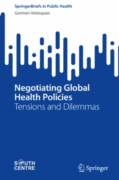Book by the South Centre, 2025
Negotiating Global Health Policies
Tensions and Dilemmas
 Description:
Description:
This book presents reflections and research that highlight tensions in the negotiations on pandemic preparedness treaties and revisions to the International Health Regulations, underscoring the geopolitical divide between developed and developing countries. It advocates regional health initiatives as a response to the multilateral impasse and reflects on the erosion of foundational public health concepts such as “essential medicines”.
New pandemics are inevitable. How can we best prepare for them and, above all, how can we avoid the mistakes and injustices made during the COVID-19 pandemic?
How can equitable access to medicines and diagnostics be guaranteed when they are produced in a small number of countries? How can we explain the fact that current funding for cooperation in the field of health is in the hands of a small group of Northern countries and foundations from the North? How can the role of the World Health Organization be strengthened? WHO now plays only a minor role in coordinating public health policies. How is it that the concept of “essential medicines”, a major advance in public health policy, is being replaced by that of “medical countermeasures”, a term more in line with the private sectors?
Preparing for future pandemics forces us to ask ourselves: how can we safeguard the general interest, the defense of human rights and public health?
Negotiating Global Health Policies: Tensions and Dilemmas is essential reading for negotiators from the 194 member countries of the World Health Organization (WHO), the World Trade Organization (WTO), and the World Intellectual Property Organization (WIPO) who participate in international negotiations on health and development. Academics and students of medicine, health sciences, law, sociology and political science, as well as intergovernmental organizations and non-governmental organizations who work on access to medicines and global health issues, also would find the book of interest.
Author: Germán Velásquez is Special Adviser, Policy and Health of the South Centre in Geneva, Switzerland. Previously, he was Director of the Secretariat on Public Health, Innovation and Intellectual Property at WHO. He represented WHO at the WTO TRIPS Council from 2001 to 2010. He is the author and co-author of numerous publications on health economics and medicines, health insurance schemes, globalization, international trade agreements, intellectual property and access to medicines.
He obtained a Master’s degree in Economics and a PhD in Health Economics from Sorbonne University, Paris. In 2010, he received a Honoris Causa PhD on Public Health from the University of Caldas, Colombia and in 2015 he received another Honoris Causa PhD from the Faculty of Medicine of the Complutense University of Madrid, Spain.












